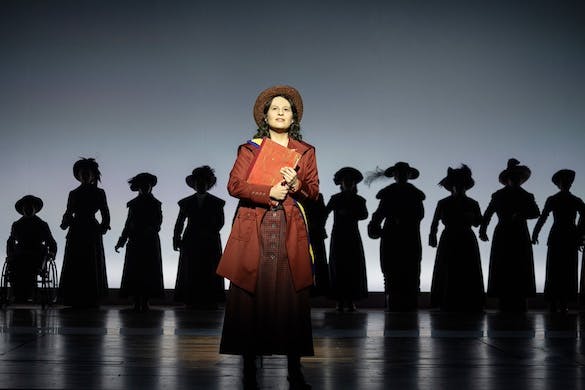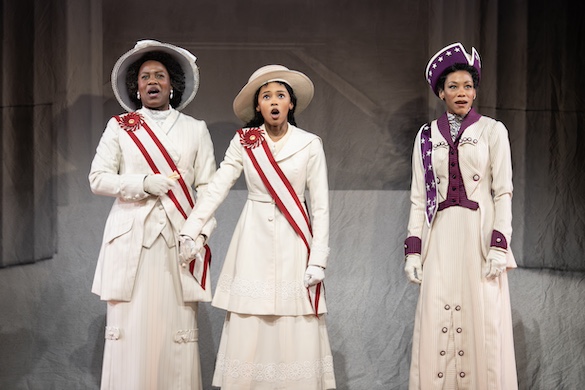Is ‘Suffs: The Musical’ Worthy of All the Hype?
The Broadway production offers more character than its ‘Hamilton’-like predecessor, but still doesn’t quite fulfill its weighty ambitions.

It is unusual, even in our media-saturated age, for a Broadway production to arrive with as much breathlessly cultivated anticipation as that now attending “Suffs: The Musical.” Since having its premiere at the Public Theater two years ago, this account of the progress and setbacks that met the women’s suffrage movement in the years just before our right to vote was established has been praised by its advocates with words such as “groundbreaking” and, loftier still, “important.”
The hype only grew last fall, when Hillary Rodham Clinton and a Nobel Prize-winning peace activist, Malala Yousafzai, signed on as producers, becoming high-profile ambassadors for the show as it prepared to move uptown. “I can’t wait for audiences to experience this soul-stirring slice of long-overlooked American history,” Mrs. Clinton said in a statement at the time, calling the musical “both entertaining and enlightening.”
My own impression after catching a performance of “Suffs” in 2022 was that it could be too closely compared — and not in a favorable way — to another musical I had first seen at the Public: “Hamilton.” And as several reviews indicated, I wasn’t the only one who had this reaction.
Like Lin-Manuel Miranda’s celebrated blockbuster, “Suffs” focuses on the determined efforts of a precocious, nervy, socially awkward young upstart — in this case, Alice Paul, a leading figure in the campaign to pass the 19th Amendment — to push forward American society. And as was the case with “Hamilton,” that protagonist is played by the same person who wrote the show’s book, music, and lyrics: Here, that’s Shaina Taub, an artist in residence at the Public who has earned acclaim for her work off-Broadway and at London.
Yet the similarities that struck me were more substantive, from a simple thing such as Ms. Taub’s decision to cast President Woodrow Wilson as a jolly, hammy villain — just as King George had been in Mr. Miranda’s musical — to rousing production numbers that, for me, seemed to nod to a couple in “Hamilton” not just in spirit but in their melodic and rhythmic structures, evoking sub-par variations on modern classics like “Alexander Hamilton” and “My Shot,” minus the rapping.

For the Broadway staging, Ms. Taub has retained a few of those numbers, though the score, like the libretto, has been revised substantially; half the songs included here are new. As a result, “Suffs” has acquired more of its own character, even if the production — which features a predictably diverse and impressive cast, vigorously directed by Leigh Silverman — doesn’t quite fulfill its ambitions.
The show now begins with Carrie Chapman Catt — a leader from the generation before Paul’s, who was also instrumental in securing suffrage — singing “Let Mother Vote,” a jaunty new tune that wittily establishes, and parodies, this character’s more diplomatic approach to activism. Carrie is depicted here as a sort of frenemy to Alice, a mentor who, disapproving of her protégée’s style, becomes a rival. (Imagine an older Aaron Burr.)
Carrie is played by musical theater veteran Jenn Colella, whose clarion voice and magnetic poise make her a good foil for Ms. Taub’s Alice. The latter role seems tailored both to its creator’s limitations and considerable charm as a performer, with a few of Alice’s songs emerging as winsome showcases for their composer’s nasally but appealingly piquant singing.
Ms. Taub has also taken care to acknowledge the women of color who were prominent in the movement but weren’t allowed to enjoy its early fruits with their white sisters. Nikki M. James, another Broadway favorite with a radiant voice and presence, plays Ida B. Wells, and Anastaćia McCleskey radiates warmth as a fellow journalist and civil rights champion, Mary Church Terrell. Like Alice and Carrie, Ida and Mary can clash, but the latter duo’s bond seems reinforced by a relative lack of privilege.
Other standouts in the company include Hannah Cruz, who inherits the role of crusading lawyer and free spirit Inez Milholland from Public cast member Phillipa Soo (the original Eliza in “Hamilton,” incidentally), lending her own glamor and, happily, a little more spice; and Grace McLean, at once impish and sinister as President Wilson.
Paul Tazewell’s smart period costumes and Charles G. LaPointe’s hair and wig design enhance our admiration by underscoring how far ahead of their time these women were, while Ms. Taub also emphasizes how the work documented here remains incomplete — as work of this kind always does.
“You won’t live to see the future that you fight for,” Alice sings in the closing number, “Keep Marching”; joining her, the ensemble urges, “Learn as much from our success as our mistakes.” It’s a worthy message; I just wish that “Suffs” offered more of the kind of inspiration that it duly honors.

